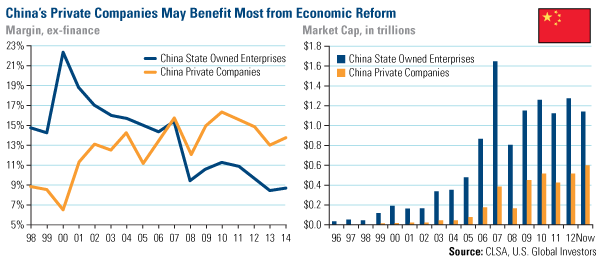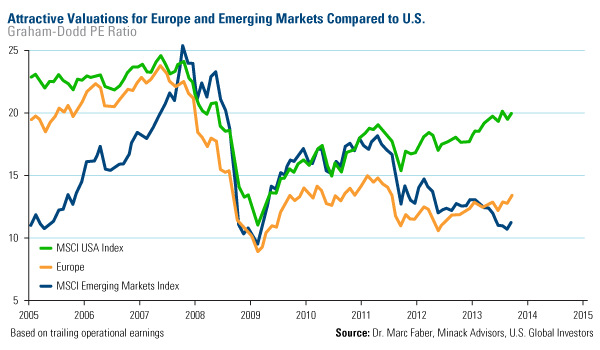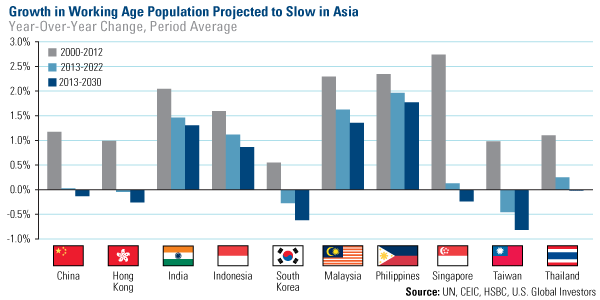Emerging Markets Radar (November 4, 2013)
Strengths
- China’s October official manufacturing PMI exceeded market expectation at 51.4 up from 51.1 in September, and beats market consensus of 51, indicating China is sustaining its economic growth coming into the fourth quarter of the year. The HSBC final PMI is unchanged from flash number at 50.9 up from 50.2 in September, also confirming China’s economy is in expansionary territory.
- Macau October gross revenue was MOP36.5 billion, reaching a new record after growing 32 percent year-over-year, exceeding market expectations. Macau’s momentum continues as the largest enclave of gaming entertainment in the world, supported by the vast population in China.
- Among Chinese companies that have reported third-quarter earnings, including dual-listed H-shares companies in Hong Kong, they have shown earnings growth of 21.2 percent year-over-year, showing noticeable improvements from the 13.4 percent growth in second quarter this year and -2.5 percent in the third quarter in 2012. Core earnings of non-financials went up by 24.8 percent versus -6.9 percent in second quarter and -26.9 percent in the same period of last year, according to Bank of America Merrill Lynch equity research analysts.
- The H-share listed Chinese banks reported third-quarter net profit after tax growth of 11.2 percent year-over-year, net interest margin improvement of 1 basis point over the prior quarter to 2.57 percent, loan growth of 13 percent year-over-year, and low non-performing loan ratio of 0.98 percent. Net fee income fell by 10.4 percent on a quarter-over-quarter basis, but grew 18.4 percent year-over-year. The sector showed tight cost control and de-leveraging which lead to strong asset quality and improving capital ratio.
- Hong Kong’s September loan growth was 2.2 percent month-over-month, 18.1 percent year-over-year, and 14.9 percent year-to-date, while deposits were 2.9 percent month-over-month, 12.2 percent year-over-year, and 7.3 percent for the year-to-date period at the end of September, showing the strength of money supply.
- Indonesia’s October CPI declined to 8.32 percent down from 8.40 percent in September and 8.79 percent in August. The impact of the fuel price hike on inflation is over as the government had expected.
- Korean October exports grew by 7.1 percent year-over-year and 3.9 percent month-over-month. The faster-than-expected growth is driven by recovery in the U.S. and eurozone, continued upswing in information technology and auto, and increased exports to emerging markets.
- Moody's ratified Chile's Aa3 sovereign debt rating this week while maintaining the outlook at stable. The credit rating agency stressed that the country's social and political consensus implies a continuation of the solid institutional framework going forward. Fitch Ratings also ratified its A+ Chilean sovereign debt rating last week.
- An annual World Bank study on business environment has reported Russia made the most progress among the biggest emerging economies in implementing policies to improve its business environment. The jump from 112th position last year report to 92nd place this year was the biggest gain among the BRIC nations. President Vladimir Putin, who is facing lackluster economic growth and high inflation, ordered the government to improve Russia’s standing in the ranking to 20th by 2018 as part of a plan announced after his inauguration to a third term last year.
Weaknesses
- Indonesian trade balance in September worsened to a deficit of $657 million (+$72 million in August and -$2.3 billion in July), mainly due to still weak exports, which reached $14.8 billion, but remained weak, down 7 percent year-over-year. Imports were relatively stagnant, up 1 percent year-over-year in September.
- The amnesty bill’s third reading in Thailand’s parliament could flare a political risk in addition to weak private consumption (down 6.1 percent in September) and deteriorating manufacturing production index (down 2.9 percent in September and down 2.8 percent in August), and a current account deficit of $6.05 billion year-to-date at the end of September.
- Deflationary pressure continued in Korea when October CPI fell further to 0.7 percent, the lowest since 1999, due to favorable weather conditions and a strengthening won.
- Despite recent signs of recovery in the Mexican economy, HSBC has lowered its GDP estimates for this year to 1.3 percent from 1.7 percent. The two main reasons behind the revision are: 1) natural disasters that occurred in September have negatively impacted some productive activities; and 2) the partial government shutdown in the U.S., which may prompt lower U.S. GDP growth for the remainder of the year.
- Czech general election results from last weekend are extending political uncertainty in the central European nation, according to Moody’s. The inconclusive election result, in which the Social Democrats claimed victory by a very narrow margin, is likely to result in difficult and lengthy negotiations to form a government, and will “likely prolong the political uncertainty that has deterred economic sentiment over the last few months,” according to the U.S. based credit rating agency.
Opportunities
- As shown in the charts above, in China, private companies are playing increasingly important roles in the economy by creating most of the jobs in the country. Due to their efficiency and better incentives for outperformance, the private sectors have seen their gross profit margins surpass those for state-owned enterprises (SOE) and their market cap are increasing versus decreasing for SOEs. Many of the upcoming reforms in China are concerning opening up SOE monopolized sectors to private companies, which will be adding another driver to revenue and profit growth for privately-own companies.
- The Peruvian government announced investments in infrastructure for a total of $8 billion, to be deployed by early 2014, in projects including the Metro line 2 of Lima, and the building or expansion of airports. Similarly, Colombian President Juan Manuel Santos opened the auction process for the first tranche of the 4th generation road concession program, which is estimated to require a $5.9 billion investment.
- Greek stocks are outperforming almost every market in the world as a six-year recession eases and new investors consider purchases. Since bottoming out on June 5, 2012, the country’s ASE Index has surged 159 percent, still 77.5 percent below its 2007 peak. As a result of the lengthy crisis, Greek companies cut their cost bases, cutting wages and pensions, and set the ground for profitability growth to surprise once the economy starts growing. Equity fund flows into Greece rose 129 percent from the beginning of the year through October 28, handsomely outpacing the 15 percent rise for Europe as a whole, data from EPFR Global Inc. show. The next likely catalyst will come as emerging market funds with a mandate to follow MSCI indexes will start to invest in Greek stocks after Greece is included officially in the MSCI Emerging Markets Index on November 26.
- Not only is valuation of European equities low relative to S&P 500, but they are also forming a major low against emerging market equities, technically speaking. The further outflows from emerging markets are likely to go to Europe as opposed to the U.S.
Threats
- Between October 19 and 30, China's interbank rates surged by about 220 basis points but finally slid on October 31 by 60 basis points. Having been concerned about a possible repeat of the June liquidity squeeze and monetary tightening in the past 10 days, investors finally breathed a sigh of relief. Analysts and economists believe markets are overly sensitive to the volatility in China's interbank markets, while the People’s Bank of China (PBOC) could improve its skills in open market operations (OMO) and communication. BofA Merrill Lynch expected the interbank rates to fall back to a normal level (between 3-4 percent for overnight Shibor).
- Brazil's state-run oil company Petrobras said in a market filing it has proposed a methodology to its government-controlled board that would automatically adjust domestic diesel and gasoline prices to international prices. According to Reuters, the company has lost more than $14 billion since the start of 2012 in its refining division due to a government policy that holds down fuel prices to contain inflation. The company imports fuel at international prices then sells it at a 10 to 15 percent loss at home. The price adjustment is unlikely to be approved given that government controls on fuel prices have been vital as Brazil's central bank has been battles high inflation.
- A recent HSBC Economic Research report shows growth in working age populations is set to slow sharply over the coming 10 years in all Asian markets, with China, Hong Kong, Korea, Singapore, Taiwan and Thailand among the most affected. Even in the better faring Asian nations, working age populations will not expand as rapidly as in the recent past. HSBC concludes that, assuming no change to productivity growth, and a steady rate of investment, this demographic shift inevitably represents a drag on GDP growth, by means of fewer additional workers and less incremental output. Just in China, one of the better faring economies, a slowdown in the growth of the working age population could shave about 0.5 percent off annual GDP growth, according to HSBC.


















